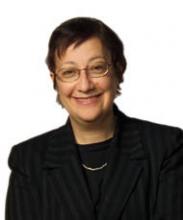The announcement late on March 9 from the Food and Drug Administration that it had approved belimumab as a treatment for systemic lupus erythematosus, the first new treatment approved for this disease in more than 50 years, produced reaction among lupus specialists that ran the gamut from unrestrained elation to somewhat more restrained enthusiasm.
Regardless of the degree of caution experts might have about the efficacy of belimumab and the consequences of its widespread use, there was no denying that its approval marked a milestone for the management of patients with systemic lupus erythematosus (SLE).
"I've been calling my friends and going yippee. This is a historic day for lupus patients," said Dr. Joan T. Merrill, professor of medicine and chair of the clinical pharmacology research program at the Oklahoma Medical Research Foundation in Oklahoma City, who participated in the belimumab trials and exemplified a more enthusiastic take on the drug's approval.
A more cautious but still welcoming view came from Dr. David Wofsy, who was not involved in the belimumab studies. "I expect the drug will be widely used in lupus, given the great, unmet need for new therapies. But patients and physicians need to remain cognizant of the fact that roughly half of the subjects in the trials did not achieve the desired clinical outcome" a novel measure designed specifically for the two pivotal belimumab trials, the SLE Responder Index, said Dr. Wofsy, a professor of rheumatology at the University of California, San Francisco.
"Moreover, at this point, there is relatively little information about the effect of belimumab in patients with the most serious manifestations of lupus," such as active nephritis and central nervous system manifestations, Dr. Wofsy said in an interview. The majority of patients in the belimumab trials had cutaneous manifestations, musculoskeletal manifestations, or both, so we are beginning to understand the potential benefit of the drug in these patients. It will take time and undoubtedly more trials before we know how the drug will perform in patients with other manifestations.
"There is understandably great excitement about this landmark achievement, but patients and physicians will be well served if they remain realistic in their expectations and cautious in their use of a new agent," Dr. Wofsy said.
Dr. Merrill applied less caution in her assessment of the role belimumab will fill once physicians start prescribing it.
"I believe it will be tried in many [SLE] patients over the next year," she said in an interview. "I will certainly try it in many of my patients. The majority of lupus patients will flare sooner or later on the medicine they're on. If they flare a little, I'd first look to raise the dose of the drug they're on before I go to a brand new biologic such as belimumab. But we have a lot of patients where that [raising the dose] won't work, and they deserve a chance to try" the new drug. "The data from the trials show us that belimumab won't be the perfect drug for every patient, but there may be a substantial number of patients who may be helped. A patient doing well on a less expensive drug is not a candidate for changing treatment to belimumab, but there are many patients who are candidates."
What remains less clear today is the possible role of belimumab as initial therapy. "There are no treatment algorithms in SLE; there is no clinical trial evidence to know which drug to start first," Dr. Merrill said. A patient with SLE and predominant arthritis symptoms might initially get started on methotrexate, but if that is only partially effective, it would be reasonable to use belimumab as the next step, she said. An SLE patient who presents with a significant rash as the predominant symptom might start on methotrexate or another oral immunosuppressant, and again, belimumab could later be added if needed. Or the patient may be intolerant of such drugs as azathioprine or mycophenolate, prompting a faster progression to belimumab. Hydroxychloroquine monotherapy usually can't adequately control substantial SLE symptoms.
Although the two companies that will jointly market belimumab (Benlysta), Human Genome Sciences and GlaxoSmithKline, have not yet announced the drug's pricing, expectations are that it will be high. "There is no such thing as a cheap biologic," especially while it remains on patent, Dr. Merrill noted. But the world of drug options for treating SLE is somewhat unique, because virtually none of the standard-of-care options has labeling for SLE.
"For many years, insurers refused to cover expensive biologics" for SLE patients, Dr. Merrill said. "I've had to fight to get my patients access, even the ones who were very sick. The payer's argument was that the drug was not approved for lupus. Now it's the expensive drug that's approved, but the inexpensive ones aren't. Insurers will have trouble because if they say 'Have you tried azathioprine or methotrexate?' I can say 'But those drugs are not approved for lupus.' "


